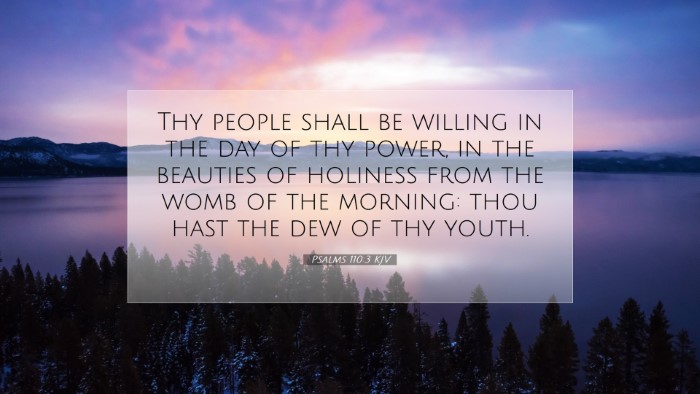Psalms 110:3 - A Comprehensive Commentary
Verse Analysis: “Thy people shall be willing in the day of thy power: in the beauties of holiness from the womb of the morning: thou hast the dew of thy youth.”
This verse is a profound declaration of the divine calling and authority of Christ, illustrating the nature of His kingdom and the eagerness of His followers. As scholars and theologians examine this text, several key themes merit in-depth study.
The Day of His Power
Matthew Henry emphasizes that the phrase “the day of thy power” refers to the time when God manifests His might through His chosen leader, who is identified as the Messiah. This day signifies a season of revival and awakening where the hearts of the people are stirred to willingly submit to the authority of their King.
Henry highlights that this power is not coercive but transformative, marking a profound shift in the hearts of the people. They are described as “willing,” suggesting a voluntary alignment with God’s purpose rather than an enforced submission.
The Beauty of Holiness
Albert Barnes expounds upon the “beauties of holiness” mentioned in the verse. This phrase can be interpreted to mean the attractive and radiant virtues of Christ’s kingdom. The holiness of God is characterized by purity, righteousness, and an irresistible charm that affects the beholder profoundly. Barnes suggests that when the power of God descends, it embodies these beauties which draw people to God.
This beauty is not only aesthetic but also moral, drawing His followers closer to holiness in their life and character. The holiness of God manifested through Christ cultivates a willingness among the people to follow Him, reflecting the transformative power of divine righteousness.
The Womb of the Morning
Adam Clarke provides insights into the phrase “from the womb of the morning.” He interprets this as a metaphor for new beginnings, suggesting that just as the dawn brings light and new opportunities, so does Christ’s power herald a new era of spiritual renewal and enlightenment.
Clarke notes that the dawn symbolizes hope and rejuvenation, implying that with every new day, there is a fresh supply of grace and strength for God’s people. In this context, the imagery of dew represents the freshness and vitality that accompany a life surrendered to God’s will.
The Dew of Youth
The phrase “thou hast the dew of thy youth” indicates a further aspect of vitality and freshness associated with God’s power. Matthew Henry asserts that the dew is essential for growth and sustenance, symbolizing the life-giving presence of God as He nourishes His people. This dew from the King signifies the youthfulness and vitality of His spirit, invigorating His people to serve Him zealously.
Henry also comments on the implications of youth in this context. The “dew of youth” relates to vitality, energy, and the vigor of a passionate service to God. It underscores the idea that, under Christ's reign, His followers are renewed in strength and purpose as they engage in the mission to which they are called.
The Willingness of the People
The notion of willingness elaborated on by Albert Barnes is critical to understanding the nature of true followership in the Kingdom of God. It represents a deep-seated desire to serve and submit to God, cultivated through the Holy Spirit’s work in the hearts of believers. The “day of thy power” refers to instances when God intervenes in human history, prompting individuals and communities alike to turn to Him with eagerness and dedication.
Barnes posits that the reality of God’s power, as experienced through the changing circumstances of life and history, leads to an increase in the number of willing volunteers for His service. This willingness is a response to His love, grace, and the impending revelation of His kingdom.
Conclusion
In summary, Psalms 110:3 encapsulates crucial theological truths pertaining to the nature of Christ’s kingship and the response it elicits within His people. The willingness of the faithful to serve is both a gift from God and an evidence of His inspiring power. The call to holiness and the renewed strength of youth signify a life that continually seeks to reflect the beauty of Christ in every aspect.
As pastors, students, and scholars reflect on this passage, they are encouraged to embrace the transformative power of God’s presence, recognizing that the beauty of holiness compels a response of total surrender and enthusiastic engagement in furthering His kingdom.


